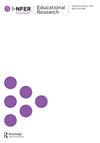探索教师可持续持续专业发展的赋权实践
IF 2.6
3区 教育学
Q1 EDUCATION & EDUCATIONAL RESEARCH
引用次数: 6
摘要
摘要背景如何最好地实现可持续的职业发展仍然是一个具有挑战性的问题。本文报告的研究是在专业学习社区(PLC)方法的范围内进行的,该方法是持续专业发展(CPD)的长期目标,行动研究(AR)原则是组织的一种手段。目的本研究的目的是调查如何构建和促进教师的持续专业发展,以实现可持续的专业发展。在这种情况下,“可持续”是指专业学习在相关课程持续时间之外的影响。方法采用以AR为导向的CPD课程作为案例研究,重点关注参与者的经验,即课程工作如何影响他们的专业实践,以及促成这一目的的因素。数据是对完成该课程6个月后的11名在职教师进行的定性访谈。访谈采用定性内容分析法进行归纳分析。研究结果分析确定了八个不同的类别,这些类别与参与者对AR启发的CPD过程如何影响他们的实践的经历有关。就范围而言,影响与三个总体层面有关:个人层面、学校层面和更广泛的社区层面。此外,我们确定了十个相互关联的因素,这些因素似乎会影响该过程的范围和质量。结论研究结果强调了将CPD课程与参与者自身实践相结合的重要性,并深入了解了合作和学院关系对可持续职业发展的重要性。这项研究反映了合作战略和结构的增加如何有可能将学校文化转变为更具合作性的文化。它还提请人们注意认知和情感方面在发展过程中是如何交织在一起的:教师们表示,同事和领导层的认可和支持行动支撑了发展,赋予了他们权力,并激励他们成为变革的积极推动者。本文章由计算机程序翻译,如有差异,请以英文原文为准。
Exploring empowering practices for teachers’ sustainable continuing professional development
ABSTRACT Background The question of how best to enable sustainable professional development remains a challenging one. The research reported here is situated within a professional learning communities (PLCs) approach as a long-term goal for continuing professional development (CPD) with action research (AR) principles as a means of organisation. Purpose The aim of the study was to investigate how teachers’ CPD can be structured and facilitated to enable sustainable professional development. In this context, ‘sustainable’ refers to an impact of professional learning beyond the duration of the course in question. Method An AR-oriented CPD course was used as a case study, with a specific focus on the participants’ experiences of how the course work affected their professional practice and the enabling factors contributing to this end. Data were qualitative interviews with the 11 in-service teachers who completed the course, 6 months after its completion. The interviews were analysed in an inductive manner using qualitative content analysis. Findings The analysis identified eight different categories relating to participants’ experiences of how the AR-inspired CPD process affected their practice. Effects were connected to three overarching levels in terms of scope: individual level, school level and level of the wider community. In addition, we determined ten interconnected factors that appeared to influence the scope and quality of the process. Conclusions The findings highlight the importance of grounding CPD courses in participants’ own practice and offer insights into the significance of collaboration and collegial relationships for sustainable professional development. The study reflects how an increase in strategies and structures for collaboration has the potential to transform school cultures into more collaborative ones. It also draws attention to how cognitive and affective aspects are intertwined during developmental processes: teachers suggested that acknowledgement and supportive actions of colleagues and leadership had underpinned development, empowered them and spurred them on as active agents of change.
求助全文
通过发布文献求助,成功后即可免费获取论文全文。
去求助
来源期刊

Educational Research
EDUCATION & EDUCATIONAL RESEARCH-
CiteScore
4.00
自引率
2.90%
发文量
0
期刊介绍:
Educational Research, the journal of the National Foundation for Educational Research (NFER), was established in 1958. Drawing upon research projects in universities and research centres worldwide, it is the leading international forum for informed thinking on issues of contemporary concern in education. The journal is of interest to academics, researchers and those people concerned with mediating research findings to policy makers and practitioners. Educational Research has a broad scope and contains research studies, reviews of research, discussion pieces, short reports and book reviews in all areas of the education field.
 求助内容:
求助内容: 应助结果提醒方式:
应助结果提醒方式:


